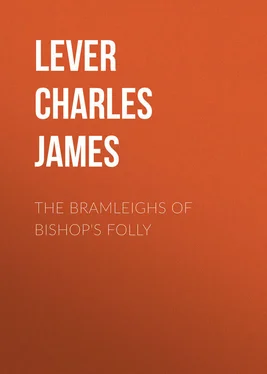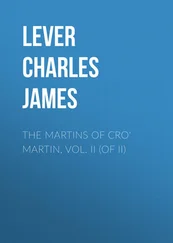Charles Lever - The Bramleighs of Bishop's Folly
Здесь есть возможность читать онлайн «Charles Lever - The Bramleighs of Bishop's Folly» — ознакомительный отрывок электронной книги совершенно бесплатно, а после прочтения отрывка купить полную версию. В некоторых случаях можно слушать аудио, скачать через торрент в формате fb2 и присутствует краткое содержание. Издательство: Иностранный паблик, Жанр: literature_19, foreign_antique, foreign_prose, на английском языке. Описание произведения, (предисловие) а так же отзывы посетителей доступны на портале библиотеки ЛибКат.
- Название:The Bramleighs of Bishop's Folly
- Автор:
- Издательство:Иностранный паблик
- Жанр:
- Год:неизвестен
- ISBN:нет данных
- Рейтинг книги:4 / 5. Голосов: 1
-
Избранное:Добавить в избранное
- Отзывы:
-
Ваша оценка:
- 80
- 1
- 2
- 3
- 4
- 5
The Bramleighs of Bishop's Folly: краткое содержание, описание и аннотация
Предлагаем к чтению аннотацию, описание, краткое содержание или предисловие (зависит от того, что написал сам автор книги «The Bramleighs of Bishop's Folly»). Если вы не нашли необходимую информацию о книге — напишите в комментариях, мы постараемся отыскать её.
The Bramleighs of Bishop's Folly — читать онлайн ознакомительный отрывок
Ниже представлен текст книги, разбитый по страницам. Система сохранения места последней прочитанной страницы, позволяет с удобством читать онлайн бесплатно книгу «The Bramleighs of Bishop's Folly», без необходимости каждый раз заново искать на чём Вы остановились. Поставьте закладку, и сможете в любой момент перейти на страницу, на которой закончили чтение.
Интервал:
Закладка:
“I don’t say,” added he, after a moment, “that the scheme may not be a good one, – an excellent one. Sampson says that all manufactures will be transferred to Ireland yet, – that this will be in some future time the great seat of national industry and national wealth. Let your grand friend come then, by all means; there is at least one topic we can talk over together.”
Too happy to risk the success he had obtained by any further discussion, Temple hurried away to give orders for the great man’s reception. There was a small suite of rooms which had been furnished with unusual care and elegance when it was believed that Lady Augusta would have honored Castello with her presence. Indeed, she had so far favored the belief as to design some of the decorations herself, and had photographs taken of the rooms and the furniture, as well as of the views which presented themselves from the windows.
Though these rooms were on the second floor, they were accessible from without by a carriage-drive, which wound gradually up among the terraced gardens to a sort of plateau where a marble fountain stood, with a group of Naiads in the midst, over whom a perpetual spray fell like a veil; the whole surrounded with flowery shrubs and rare plants, sheltered from east and north by a strong belt of trees, and actually imparting to the favored spot the character of a southern climate and country.
As the gardener was careful to replace the exhausted or faded flowers by others in full bloom, and as on every available day he displayed here the richest treasures of his conservatory, there was something singularly beautiful in the contrast of this foreground, glowing in tropical luxuriance, with the massive forest-trees down below, and farther in the distance the stern and rugged lines of the Mourne Mountains, as they frowned on the sea.
Within doors, everything that wealth could contribute to comfort was present, and though there was magnificence in the costly silk of the hangings and the velvety richness of the carpets, the prevailing impression was that it was enjoyment, not splendor, was sought for. There were few pictures, – a Ruysdael over the fireplace in the drawing-room, and two or three Cuyps, – placid scenes of low-lying landscapes, bathed in soft sunsets. The doors were all hidden by heavy curtains, and a sense of voluptuous snugness seemed the spirit of the place.
The keys of this precious suite were in Marion’s keeping, and as she walked through the rooms with Temple, and expatiated on the reckless expenditure bestowed on them, she owned that for any less distinguished guest than the great diplomatist she would never have consented to their being opened. Temple, however, was loud in his praises, went over his high connections and titled relatives, his great services, and the immense reputation they had given him, and, last of all, he spoke of his personal qualities, the charm of his manner, and the captivation of his address, so that finally she became as eager as himself to see this great and gifted man beneath their roof.
During the evening they talked much together of what they should do to entertain their illustrious guest. There was, so to say, no neighborhood, nor any possibility of having people to meet him, and they must, consequently, look to their home resources to amuse him.
“I hope Augustus will be properly attentive,” said Temple.
“I ‘m certain he will. I ‘m more afraid of Nellie, if there be anything strange or peculiar in Lord Culduff’s manner. She never puts any curb on her enjoyment of an oddity, and you’ll certainly have to caution her that her humoristic talents must be kept in abeyance just now.”
“I can trust Lord Culduff’s manner to repress any tendency of this kind. Rely upon it, his courtly urbanity and high tone will protect him from all indiscretions; and Nelly, – I ‘m sorry to say it, Marion, but Nelly is vulgar.”
“She is certainly too familiar on fresh acquaintance. I have told her more than once that you do not always please people by showing you are on good terms with yourself. It is a great misfortune to her that she never was ‘out’ before she came here. One season in town would have done more for her than all our precepts.”
“Particularly as she heeds them so little,” said Temple, snappishly.
“Cannot we manage to have some people to meet Lord Culduff at dinner? Who are the Gages who left their cards?”
“They sent them – not left them. Montifort Gage is the master of the hounds, and, I believe, a person of some consideration here. He does not, however, appear to invite much intimacy. His note acknowledging our subscription – it was a hundred pounds too – was of the coldest, and we exchanged a very few formal words at the meet yesterday.”
“Are we going to repeat the Herefordshire experiment here, then?” And she asked the question with a sparkling eye and a flushed cheek, as though the feeling it excited was not easily to be repressed.
“There ‘s a Sir Roger Kennedy, too, has called.”
“Yes, and Harding says he is married; but his wife’s name is not on the card.”
“I take it they know very little of the habits of the world. Let us remember, Marion, where we are. Iceland is next door but one. I thought Harding would have looked to all this; he ought to have taken care that the county was properly attentive. An agent never wishes to see his chief reside on the property. It is like in my own career, – one is only chargé d’affaires when the head of the legation is on leave.”
“And this was the county we were told was ready to receive us with a sort of frantic enthusiasm. I wonder, Temple, do people ever tell the truth!”
“Yes, when they want you not to believe them. You see, Marion, we blundered here pretty much as we blundered in England. You’ll not get the governor to believe it, nor perhaps even Augustus, but there is a diplomacy of everyday life, and people who fancy they can dispense with it invariably come to grief. Now I always told them – indeed I grew tired telling them – every mile that separates you from a capital diminishes the power of your money. In the city you reign supreme, but to be a county magnate you need scores of things besides a long credit at your banker’s.”
A very impatient toss of the head showed that Marion herself was not fully a convert to these sage opinions, and it was with a half-rude abruptness that she broke in by asking how he intended to convey his invitation to Lord Culduff.
“There ‘s the difficulty,” said he, gravely. “He is going about from one place to another. Harding says he was at Rathbeggan on Sunday last, and was going on to Dinasker next day. I have been looking over the map, but I see no roads to these places. I think our best plan is to despatch Lacy with a letter. Lacy is the smartest fellow we have, and I think will be sure to find him. But the letter, too, is a puzzle.”
“Why should it be? It will be, I suppose, a mere formal invitation?”
“No, no. It would never do to say, ‘Colonel Bramleigh presents his compliments, and requests’ – and so on. The thing must have another tone. It ought to have a certain turn of expression.”
“I am not aware of what amount of acquaintanceship exists between you and Lord Culduff,” said she, stiffly.
“The very least in life. I suspect if we met in a club we should pass without speaking. I arrived at his Legation on the morning he was starting on leave. I remember he asked me to breakfast, but I declined, as I had been three days and nights on the road, and wanted to get to bed. I never met him since. What makes you look so serious, Marion?”
“I’m thinking what we shall do with him if he comes. Does he shoot, or hunt, or fish? – can you give him any out-o’-door occupation?”
Читать дальшеИнтервал:
Закладка:
Похожие книги на «The Bramleighs of Bishop's Folly»
Представляем Вашему вниманию похожие книги на «The Bramleighs of Bishop's Folly» списком для выбора. Мы отобрали схожую по названию и смыслу литературу в надежде предоставить читателям больше вариантов отыскать новые, интересные, ещё непрочитанные произведения.
Обсуждение, отзывы о книге «The Bramleighs of Bishop's Folly» и просто собственные мнения читателей. Оставьте ваши комментарии, напишите, что Вы думаете о произведении, его смысле или главных героях. Укажите что конкретно понравилось, а что нет, и почему Вы так считаете.












